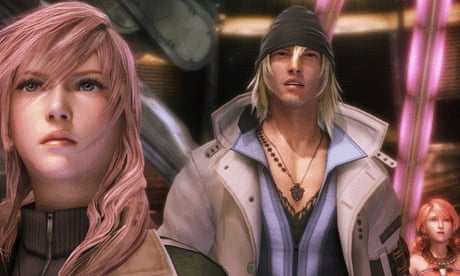The Grammys, America's foremost musical awards institution, has no Best Video Game Soundtrack category – and Steve Schnur, worldwide executive of music at Electronic Arts, isn't happy. Quoted on MCV yesterday he exclaimed,
I've been spearheading a campaign to get the Grammy Awards to recognise 'Best Video Game Score' as its own category rather than its current position in 'Best Score for a Motion Picture, Television Or Other Visual Media'," said EA's music boss Steve Schnur.
This generalisation of 'Other Visual Media' isn't merely an insult to the games industry, but a blatant dismissal of these musicians and composers. Hopefully, NARAS will take a page from BAFTA and give games the respect and recognition they deserve.
Does he have a point?
In this context, I'm not sure. For a start, the Grammy Awards already has a buttock-deadening 109 categories, so further sub-dividing one of them will only add to the suffering of the audience. Plus, it will inevitably lead to claims that Film and TV should be separated from each other, too, and then other genres might get in on the act, with enraged Bluegrass Gospel proponents demanding a separate category from those noise merchants over in the Southern Gospel camp.
As for the generalising 'Other Visual Media' tag, Schnur's indignation is academic unfortunatley as all the nominations come from films anyway – just as they did the year before. And this is possibly the real meat of the compaint: is game music really genuinely getting a proper look in beside movie soundtracks?
There have of course been some beautiful video game soundtracks over the last 30 years. Square Enix, the creator of the Dragon Quest and Final Fantasy adventure titles, takes enormous pride in its audio, with composers like Koichi Sugiyama (widely considered the godfather of orchestral game music), Nobuo Uematsu and Hitoshi Sakimoto producing lavish CD albums to accompany major releases, often including different instrumentations. The music has been performed live by orchestras all over the world, most notably perhaps in the official Distant Worlds tour. The most recent title in the series, Final Fantasy XIII, even featured a track by Leona Lewis, which can be viewed either as cultural high or depressing low depending on your standpoint.
The Square Enix titles are far from alone in their native Japan, where game soundtracks are treated, you know, seriously. Almost all music, comic and book stores will have sections dedicated to game music, and major pop stars of the region regularly provide vocals. There's a huge diversity, too, from the sweeping orchestral works of Sugiyama and co (and while I'm at it, track down a copy of Kō Ōtani's Roar of the Earth, the lovely soundtrack to Shadow of the Colossus) to bubblegum J-pop and weird electronica. Just compare, for example, the work of Uematsu with the demented soundtracks to Katamari Damacy or Vib Ribbon – though none of this will come anywhere near the Grammy radar, of course.
Since the dawn of CD Rom technology licensed soundtracks have tended to prevail in the West. Before this, we had amazing composers like Martin Galway, Rob Hubbard and Tim Follin, squeezing beautiful sounds from the limited chipsets of ancient 8bit computers. Later, there was game music superstar Tommy Tallarico, who cranked out hundreds of soundtracks during the nineties. And even amidst our licensed compilation era, there have been some astounding pieces, including soundtrack composer Barrington Pheloung's music for the Broken Sword games, British musician Richard Jacques' huge body of work for Sega, Hans Zimmer's debut video game effort for Modern Warfare 2, and James Hannigan's highly cinematic scores for the Harry Potter games. Hannigan recently oversaw an amazing performance of his game audio at the ancient St Mary's Church in Nottingham as part of the GameCity festival.
Elsewhere, we've had Trent Raznor's typically industrial clangings for legendary shooter, Quake; Kyle Gabler's calming ambience for his own game, World of Goo; and Anamanaguchi's crazed chiptune punk for Scott Pilgrim vs The World. And this year saw an utterly evocative score for Rockstar's Western adventure, Red Dead Redemption, written and performed by Bill Elm and Woody Jackson of experimental Texan group, Friends of Dean Martinez. The fact that this brilliant US-made soundtrack, created for a massively successful US-developed game, failed to even earn a nomination is the most damning indictment of the Grammy set-up. (BTW, You can ready my feature about the making of the Red Dead soundtrack here.)
Really, what this puffed up old awards ceremony needs is not a separate category for games, which would be an admittance that game scores can't compete with their movie counterparts, it's a greater understanding and appreciation of game audio as an artform. As the composers and sound engineers at LucasArts explained when I visted Skywalker Ranch earlier this year, writing game compositions is a complex undertaking, because the music needs to be modular, it has to match the player actions, which means moments of calm have to segue, in an instant, into emotional highs as an interactive battle takes place. Movie composers know exactly what the audience will be seeing at any given point. Game composers have to think, like game artists do, in three dimensions.
But then this is the Grammys where Katy Perry is up for Best Album of the Year with Teenage Dream. I think Steve Schnur would be better off setting up his own award ceremony.
So anyway, I've got to ask: what have been your favourite game soundtracks? And which have been deserving of wider recognition?

Comments (…)
Sign in or create your Guardian account to join the discussion